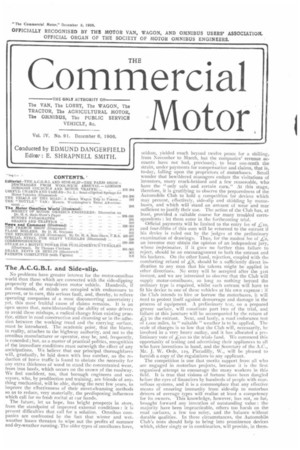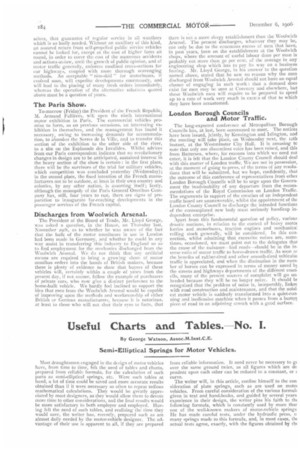The A.C.G.B.I. and Side-slip.
Page 1

Page 2

If you've noticed an error in this article please click here to report it so we can fix it.
No problems have greater interest for the motor-omnibus world than those which are connected with the side-slipping propensity of the rear-driven motor vehicle. Hundreds, if not thousands, of minds are occupied with endeavours to prevent, or to cure, this serious fault, and, thereby, to relieve operating companies of a most disconcerting uncertainty ; yet, this most fruitful cause of claims remains. It is an open secret that, notwithstanding the ability of some drivers to avoid these mishaps, a radical change from existing practice, either in road construction and cleansing or in the adhesion between the working tread and the carrying surface, must be introduced. The academic point, that the blame, in reality, attaches to the highway authority, and not to the omnibus manufacturer or operator, may be, and, frequently, is conceded; but, as a matter of practical politics, recognition of the immediate conditions must outweigh the effect of any anticipations. IVe believe that our principal thoroughfares will, gradually, be laid down with less camber, as the reduction of horse traffic is found to obviate the necessity for any extra thickness of wood to stand the concentrated wear, from iron hoofs, which occurs on the crown of the roadway. We feel confident, too, that borough engineers and surveyors, who, by predilection and training, are friends of anything mechanical, will be able, during the next few years, to improve the effectiveness of their street-cleansing methods so as to reduce, very materially, the predisposing influences which call for no fresh recital at cur hands.
The future, let us hope, has bright prospects in store, from the standpoint of improved external conditions : it is present difficulties that call for a solution. Omnibus companies are confronted by the fact that winter and wetweather losses threaten to wipe. out the profits of summer and dry-weather running. The older types of omnibuses have, seldom, yielded much beyond twelve pence for a shilling, front November to March, but the companies' revenue accounts have not had, previously, to bear one-tenth the strain, under payments for compensation and claims, that is, to-day, falling upon the proprietors of motorbuses. Small wonder that bewildered managers endure the visitations of inventors, many crack-brained and a few reasonable, who have the "only safe and certain cure." At this stage, therefore, it is gratifying to observe the preparedness of the Automobile Club to hold a competition for devices which may prevent, effectively, side-slip and skidding by motorbuses, and which will stand an amount of wear and tear sufficient to justify their use. The action of the Club has, at least, provided a suitable course for many troubled correspondents : let them enter in the forthcoming trial.
Official payments will be limited to the entry fee of ;Cm, and four-fifths of this sum will be returned to the entrant if his device is ruled out by the judges at the preliminary examination of drawings. Thus, for the modest fee of .4-2, an inventor may obtain the opinion of an independent jury, whose imprimatur, if it goes no further than failure to reject, should be an encouragement to both the entrant and his backers. On the other hand, rejection, coupled with the comforting refund of E,8, should be a sufficiently direct indication to any man that his talents might be applied in other directions. No entry will be accepted after the 31st instant, and we are interested to observe that the Club will supply motor-omnibuses, so long as nothing beyond the ordinary type is required, whilst each entrant will have to fit his device to one of these vehicles at his own expense : if the Club intends to hire or borrow the motorbuses, it will need to protect itself against demurrage and damage in the process of equipment. A preliminary test, on a prepared greasy surface, will constitute part two of the trial, and failure at this juncture will be accompanied by the return of .;.5 to the entrant. Next, and lastly, a road endurance test of ',coo miles, in " suitable " weather is to be applied. The scale of charges is so low that the Club will, necessarily, be involved in a very heavy outlay, and it has allocated a preliminary vote of 41o;) to the trials fund. We commend this opportunity of testing and advertising their appliances to all who have inventions in hand, and the Secretary of the A.C., Mr. J. XV. Orde, 119, Piccadilly, XV., will be pleased to furnish a copy of the regulations to any applicant. The competition is one that merits support from all who are engaged in motorbus projects' because it is the first organised attempt. to encourage the many workers in this field. It is true that visions of fortune have been dangled before the eyes of financiers by hundreds of people with marvellous systems, and it is a commonplace that any effective means of ensuring immunity from side-slip to motorbus drivers of average types will realise at least a competency for its owners. This knowledge, however, has not, so far, brought forward any invention of outstanding. value : the majority have been impracticable, others too harsh on the road surfaces, a few too noisy, and the balance without durable qualities. In these circumstances, the Automobile Club's tests should help to bring into prominence devices which, either singly or in combination, will provide, in them
selves, that guarantee of regular service in all weathers which is so badly needed. Without an auxiliary of this kind, an assured return from self-propelled public service vehicles cannot be looked for, except at the cost of higher fares all round, in order to cover the cost of the numerous accidents and actions-at-law, until the growth of public opinion, and of motor traffic generally, enforces modified cross-sections for cur highways, coupled with more thorough scavenging methods. An acceptable " nn-skid " for motorbuses, if evolved soon, will expedite developments enormously, and will lead to the placing of many tresh orders immediately, whereas the operation of the alternative solutions quoted above must be a question of years.
The Paris Show.
To-morrow (Friday) the President of the French Republic, M. Armand Fallieres, will open the ninth international motor exhibition in Paris. The commercial vehicles promise to form, as on previous occasions, an interesting exhibition in themselves, and the management has found it necessary, owing to increasing demands for accommodation., to abandon the Serres de In Ville, and to transfer this section of the exhibition to the other side of the river, to a site on the Esplanade des Invalides. Whilst adyices from our Paris correspondent.indicate that no revolutionary changes in design are to be anticipated, sustained interest in the heavy section of the show is certain: in the first place, there will be the survivors of the trial for military vehicles, which competition was concluded yesterday (Wednesday); in the second place, the fixed intention of the French manufacturers not to be outdone, at least in their own country and colonies, by any other nation, is asserting itself ; lastly, although the monopoly of the Paris General Omnibus Company has, still, four years to run, there are signs of preparation to inaugurate far-reaching developments in the passenger services of the French capital.
Discharges from Woolwich Arsenal.
The President of the Board of Trade, Mr. Lloyd George, NVEIS askecl a question, in the House, on Thursday fast, November 2uth, as to whether he was aware of the fact that the bulk of the motor omnibuses in use in London had been made in Germany, and whether he could in any way assist in transferring this industry to England so as to find employment for the mechanics discharged from the Woolwich Arsenal. We do not think that any artificial means are required to bring a growing share of motor omnibus orders into the hands of British makers, because there is plenty of evidence to show that buyers of these vehicles will, certainly within a couple of years froth the present day, if not sooner, follow the example of purchasers of private cars, who now give a distinct preference to the home-built vehicle. We hardly feel inclined to support the idea that men from the Woolwich Arsenal would be capable of improving upon the methods and workmanship of either British or German manufacturers,
because it is notorious, at least to those who will not shut their eyes to facts, that
there is net a more sleepy establishment than the 'Woolwich Arsenal. The present discharges, whatever they may be, can only be due to the enormous excess of men that have, in past years, been on the establishment at the Woolwich shops, where the amount of useful labour done per man is probably not more than so per cent. of the average in any engineering shop which has to pay its way on a business footing. Mr. Lloyd George, in his answer to the question named above, stated that he saw no reason why the men discharged from WixAwich Arsenal should not have an equal chance of engaging in such work : that a demand does exist for men may be seen at Coventry and elsewhere, but these Woolwich men will require to be prepared to speed up to a rate of work very much in excess of that to which they have been accustomed.
London Borough Councils and Motor Traffic.
The long-expected conference of Metropolitan Borough Councils has, at last, been summoned to meet. The notices have been issued, jcintiy, by Kensington and Islington, and the meeting will take place, on Wednesday next, the 12th instant, at the Westminster City Hall. It is amusing to note that only one dissentient voice has been raised, and this from Battersea, where, for reasons into which we need not enter, it is felt that the London County Council should deal with this matter of London traffic. We are not in possession, at the moment of going to press, of the terms of any resolutions that will be submitted, but we hope, confidently, that the outcome of this conference of representatives from other London Borough Councils will be to urge upon the Government the inadvisability of any departure from the recommendations of the Royal Commission on London Traffic. The arguments in support of the creation of an independent traffic board are unanswerable, whilst the appointment of the London County Council to discharge the intended functions of the contemplated new body must seriously handicap independent enterprise. Apart from this fundamental question of policy, various drastic motions, in relation to the control of heavy motor lorries and motorbuses, traction engines and mechanical rolling stock generally, will be considered. In this connection, whilst admitting that excessive noises are, some. times, occasioned, we must point out to the delegates thai the cause of the nuisance– bad roads—should be in the inverse ratio of motor traffic to horse-drawn traffic. As soon ;u the benefits of rubber-tired and other smooth-tired vehicular traffic is appreciated, and when the diminution in the num. her of horses can be expressed in terms of money saved b) the streets and highways departments of the different councils, many of the present sources of complaint will go un. heeded because they will be no longer noisy. It should bE recognised that the problem of noise is, inseparably, linke with road construction and maintenance, and that the noisi. est motor vehicle is suddenly transformed into a quiet-run. ning and inoffensive machine when it passes from a bump} piece of road to an adjoining stretch with a good surface.




























